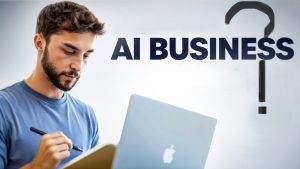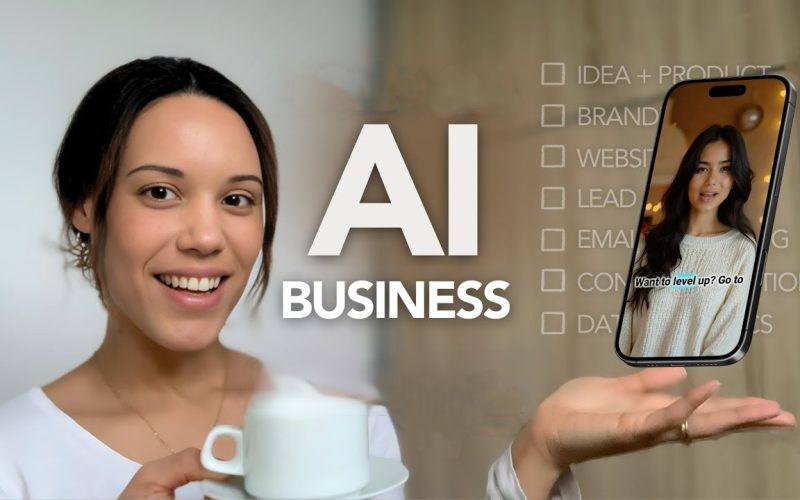Introduction
The world of business is changing quickly, and one of the biggest changes in 2025 is artificial intelligence (AI). AI is helping companies do things faster and smarter. It helps with tasks like making decisions, answering customer questions, and even doing jobs that people used to do. This article will explain how AI is changing business and the big benefits it brings to companies.
What Is AI in Business?

AI in business means using smart computer programs to do tasks like analyzing data, making decisions, and automating jobs. Some tools that help with this are called machine learning, natural language processing, robotic process automation (RPA), and predictive analytics. These tools help businesses work faster, make fewer mistakes, and improve the way they do business. AI is now easier to use than ever before and is making businesses better at serving customers and making smart choices.
AI in business can do many things, like automating repetitive jobs, creating ads just for you, helping customers faster, and even making important decisions based on data. Let’s look at how AI is changing the way businesses work.
Benefits of AI in Business
The benefits of AI in business are vast and wide-reaching. One of the key advantages is the ability to automate routine tasks, which allows employees to focus on more important, creative work. AI can also analyze large sets of data quickly and accurately, helping businesses make data-driven decisions that improve productivity and performance. Additionally, AI can enhance customer experiences by providing personalized recommendations and quicker responses through chatbots and virtual assistants. As AI continues to evolve, it offers businesses the opportunity to improve efficiency, reduce operational costs, and stay competitive in a fast-paced market.
Role of AI in Business in 2025

In 2025, AI in business will play an essential role in shaping how companies operate. From automating administrative tasks to optimizing supply chains, AI is expected to drive significant improvements in productivity and operational efficiency. Businesses will increasingly rely on AI to gather insights from data, predict market trends, and personalize customer interactions. The role of AI is not just limited to large corporations; small and medium-sized businesses will also benefit from AI tools, allowing them to compete on a more equal footing with larger players. AI will help companies stay ahead of the curve by enabling faster decision-making and fostering innovation.
How AI Is Changing Business in 2025

1. Automating Repetitive Tasks
One of the best things AI can do for businesses is help with boring, repetitive tasks. RPA helps companies automate jobs like filling out forms, managing money, and even paying workers. This allows employees to spend their time on more interesting and important work.
For example, AI-powered robots can answer customer questions, send emails, and even fix problems. This helps employees focus on harder tasks. AI is also helping with hiring by sorting resumes and interviewing candidates, speeding up the process.
Benefits of AI Automation
- Faster work because there are fewer tasks for humans to do
- Saving money by reducing the need for workers to do repetitive jobs
- Happier employees because they can focus on more important tasks
2. Improving Customer Experience
In 2025, AI is helping businesses give customers better service. AI can now understand what customers want by looking at their past actions. For example, AI helps online stores recommend things you might like based on what you’ve bought or searched for before.
AI is also helping with customer service. AI-powered robots are available all day, every day, to answer questions and solve problems. This means customers get answers faster and are happier with the service.
Benefits of AI in Customer Experience
- Personalized ads and offers that match what people like
- Faster answers through AI-powered customer service
- Happier customers because they get what they need quickly
3. Making Decisions with Data
Data is very important for businesses. But looking at all the data can be hard. AI tools help businesses understand data and find patterns. This helps them make better decisions and plan for the future.
For example, AI can help businesses figure out how many products to make, predict trends, and even make supply chains run more smoothly. AI helps companies make decisions that lead to growth.
Benefits of Data-Driven Decisions
- More accurate decisions based on facts
- Better business choices that make companies more competitive
- Smarter ways to run a business by using data
4. Making Supply Chains Work Better
AI is also helping businesses run their supply chains more smoothly. AI helps companies predict how much of a product they will need, so they don’t make too much or too little. It can also help with managing suppliers and deliveries.
For example, factories use AI to predict when machines will need fixing, so they don’t break down unexpectedly. AI also tracks products in real-time, so businesses always know where their stuff is.
Benefits of AI in Supply Chains
- Faster inventory management
- Saving money by predicting needs
- More reliable tracking of products
5. Protecting Against Fraud and Hackers
As online threats grow, businesses are using AI to keep their information safe. AI can spot unusual activity on the internet and stop fraud before it happens. For example, AI helps banks track spending to make sure no one is stealing money.
In industries like finance, AI watches transactions in real-time, flagging anything that looks suspicious. This helps protect businesses and builds trust with customers.
Benefits of AI in Security
- Early warning of fraud or unusual activity
- Better protection of important business data
- More trust from customers who know their information is safe
Integration of AI into Daily Business Operations

As we move deeper into 2025, AI in business will become an essential part of daily operations for many companies. Small tasks that once took up a lot of time, such as scheduling meetings, processing payments, or managing inventories, will be handled automatically by AI systems. This will free up employees to focus on more important, high-level tasks that require human creativity and decision-making. With AI, businesses will operate smoother and faster, improving overall productivity and allowing workers to spend more time on work that adds value. As AI technology becomes more accessible, its role in businesses of all sizes will grow even further.
Overcoming Workforce Concerns

A common concern with AI in business is the impact it may have on jobs. As AI systems take over routine tasks, some jobs may become redundant. However, AI also opens up new opportunities for workers. Companies will need employees to manage, monitor, and improve AI systems, creating demand for new roles in tech and data management. Furthermore, AI can assist workers in their roles by providing them with useful tools to be more efficient, rather than replacing them. The key challenge will be ensuring that workers have the skills needed to thrive in an AI-powered workplace, and companies will need to invest in training and development programs.
Challenges of AI in Business
While AI in business offers many benefits, it also comes with challenges. One of the main obstacles is the high initial cost of implementing AI technologies, which may be a barrier for smaller businesses. Additionally, there is a growing concern over data privacy and security as AI systems often rely on large amounts of personal and sensitive information. Businesses must ensure that their AI tools are secure and comply with regulations to protect their customers’ data. Another challenge is the potential job displacement caused by automation, which may lead to workforce concerns. Despite these challenges, businesses that embrace AI carefully and responsibly will be able to overcome these hurdles and leverage its potential.
Future of AI in Business

The future of AI in business is bright and full of exciting possibilities. As technology continues to advance, we can expect AI to become more integrated into daily business operations, with new innovations in areas like predictive analytics, customer service, and decision-making. In the coming years, AI will likely become even more intelligent, capable of learning from experience and adapting to changing market conditions. With the growth of AI tools designed for smaller businesses, we can expect broader adoption across all sectors. The future of AI in business will also focus on improving ethical standards, ensuring transparency, and addressing concerns about privacy and job displacement. As we move forward, AI in business will continue to transform how companies operate, creating new opportunities for growth, efficiency, and innovation.
Comparative Table: AI in Business Operations
| Business Area | AI Technology | Impact |
|---|---|---|
| Automating Tasks | Robotic Process Automation (RPA) | Makes work faster and saves money |
| Customer Service | AI-Powered Chatbots & Virtual Assistants | Answers questions quickly and keeps customers happy |
| Data-Driven Decisions | Predictive Analytics | Helps make smarter business decisions |
| Supply Chain | AI Forecasting | Helps track products and manage supply chains better |
| Security | Machine Learning & Behavioral Analytics | Protects against fraud and keeps data safe |
Conclusion
In 2025, AI in business is no longer just an idea for the future; it’s already here and changing how companies work. From automating tasks to giving customers better service, AI is making businesses more efficient, profitable, and competitive. As AI continues to get better, it will open up even more ways for businesses to grow and innovate.
Call to Action
Are you ready to use AI to help your business? Start by adding AI tools to make work easier, improve customer service, and make better decisions. Find out how AI can make your business more efficient and help it grow today. Visit our website to learn more about AI solutions for your business!










